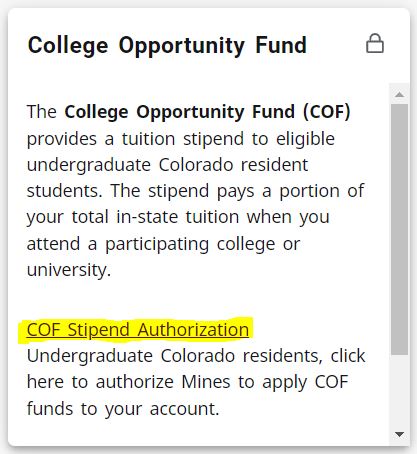College Opportunity Fund
College Opportunity Fund
College Opportunity Fund (COF)
COF is a state-funded stipend. Below are instructions on how to receive COF as well as common questions.
How to Apply for COF:
Receiving the COF at Colorado School of Mines is a two-step process. First, a student must apply for the COF through the College Assist Website: https://cof.college-assist.org.
How to 'Lifetime Authorize' COF:
Once the application has been submitted, the student must also authorize the COF stipend to their student account in Trailhead. To authorize the COF on Trailhead, follow these steps:
- Log in to Trailhead.
- Locate the “College Opportunity Fund” card (as shown below) and select “COF Stipend Authorization”.
- **Choose the ‘Lifetime Authorization’ option on the next page and click ‘Submit’. This will authorize Mines to apply the stipend to your account each semester that you are eligible to receive it.

**You only need to submit once! DO NOT select ‘Authorize’ or the stipend will not pay in for future terms. There is no confirmation page. Once you “Lifetime Authorize” the changes are automatically saved and no further action is required. Once you ‘Lifetime Authorize’ it will take 1-2 weeks for the stipend to apply.
Students should complete all steps to receive their COF before the census date to avoid delays in receiving COF.
If you experience any issues applying or authorizing your COF or have general questions about COF please contact residency@mines.edu.
COF FAQs:
How much is COF?
Because COF is a State-funded stipend, the cost can change each fiscal year. COF is $116 per credit hour.
Who is Eligible for COF?
- In-state undergraduate students.
- Degree-seeking, non-degree, and teacher enhancement/continuing education students classified as undergraduates will be eligible. Your age, your income, and your financial aid eligibility are irrelevant – students of all ages, all incomes, and all aid statuses will be eligible.
- Undergraduate non-residents students.
- Graduate students are not eligible. Graduate education (including graduate students taking undergraduate classes) is funded in a different way by the State, under a “fee for service” contract. Under this mechanism, the fee for service dollars come directly to the institution. Graduate students do not apply for COF, nor will they see any COF related information on registration information or on bills.
- Non-degree students classified at a graduate level (already having achieved a bachelor’s degree) are not eligible for COF.
COF Application Process:
- If you are legally able to get a social security number (ssn), you must use your social security number for COF.
- If you are legally unable to obtain a social security number (ssn), there is an option to indicate you do not have an ssn through the online application. The application can be found at cof.college-assist.org.
What Courses are Eligible for COF?
- Continuing education courses.
- Courses not needed for the bachelor’s degree, but planned for future transfer into a graduate program.
Tuition and COF:
COF Lifetime Hours:
If you attended another institution besides Mines, it is best to view your COF hours by accessing your College Assist account: https://cof.college-assist.org/. From there you can view your COF hours used at each institution you attended.
If you are admitted to a degree program as a freshman, you would begin your COF record as a freshman, eligible for 145 credit hours. Since COF does not distinguish between a student seeking a degree or not, any hours that are taken in either program could be eligible for COF. However, COF does distinguish where courses are taught –- hours taken in courses taught by Continuing Education/Extended Studies generally are not COF eligible and will not receive the stipend.
If you take COF eligible courses at any Colorado institution participating in COF, those hours are reported as part of your COF hours used and count toward your 145 COF hour limit. It does not matter if the hours transfer into a Mines degree program or not.
Only those eligible hours attempted once you have resident status are tracked towards the 145 COF limit.
If you take the course and fail it, the COF hours are still deducted from your COF balance.
Under the Colorado Department of Higher Education policy, any hours that you were registered for when you withdrew are deducted from your COF lifetime hours available. The COF hours will be treated as if you completed the courses. So, although you may get a tuition refund based on a campus tuition appeals process, you will not get a “refund” of COF hours.
COF Waiver:
Undergraduate students can apply for an institutional waiver. The institutional waiver can only be used once and is good for three consecutive semesters, including summer. The waiver is not guaranteed to be approved. Students must meet policy criteria to be eligible: https://www.mines.edu/policy-library/cof-waiver-policy/.
A student can get only one institutional waiver.
Residency & Colorado Opportunity Fund
Residency & Colorado Opportunity Fund
Who Qualifies for Residency
Residency Classification
Colorado Opportunity Fund (COF)
Contact Us
Registrar's Office
Student Center, Suite E280
1200 16th Street
Golden, CO 80401
Registration or student record questions
registrar@mines.edu
303-273-3200
FAX: 303-384-2253
Residency petition & COF questions
residency@mines.edu
Transfer credit questions
transfer@mines.edu
Military and VA Benefit related questions
veterans@mines.edu
Graduation questions
graduation@mines.edu